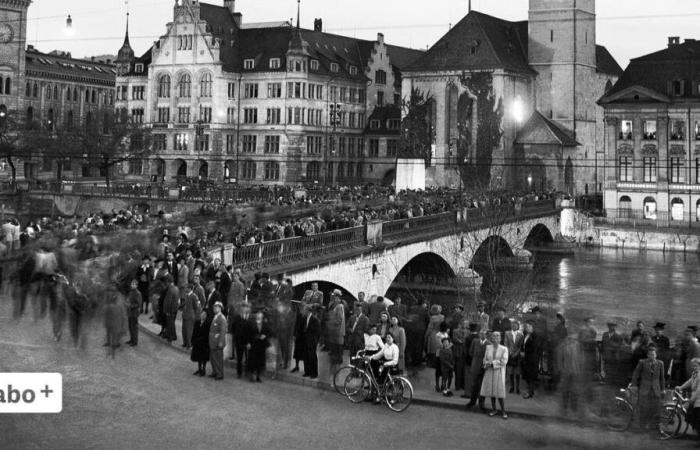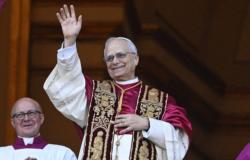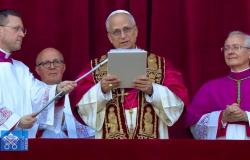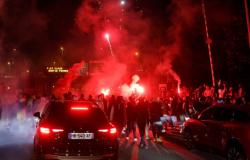Euphoric population, power -drunken Federal Council, angry Stalin: How Switzerland experienced the end of the Second world War
The fear of war ended with the surrender of Nazi Germany. Switzerland had survived the Second World War lightly. But the victorious powers saw our neutrality critically during the war. The Federal Council had to reposition the country in a new world order.
The Zurich population celebrated the end of the Second World War on the evening of May 8, 1945. The Fraumünsterkirche in the background.
Image: StR/PhotoPress archive
«Church bells announce the demolition of the acts of war. The unspeakable suffering of the peoples who were looking for by war come to an end. » With pathos in the voice, Federal President Eduard von Steiger turned to the Swiss population in a radio address on May 8, 1945. The day before, the German Wehrmacht signed unconditional surrender.
The Second World War came to an end today 80 years ago, National Socialism was history. Around 50 million fatalities should fall victim to the conflict until his final end with the surrender of Japan in September 1945. Six million Jews were murdered in the Holocaust. Whole cities were in ruins.
Switzerland, fully included in France after the defeat in June 1940 from the axis powers, had come through the war years. Apart from some of the bombs thrown over the Swiss area, she had no major damage.
Federal President of Steiger spoke on the radio about the undeserved happiness of being spared from war. ” One now wants to be an example that “also help a small country and be great”.
An euphoric population
“The Swiss population reacted euphorically to the news of the end of the war,” explains Professor Sacha Zala from the University of Bern. With the end of the war, a huge psychological burden fell off people’s shoulders. There were spontaneous joy celebrations, people stayed away from work, school lessons were discontinued.
“The neutral countries were considered villain states at the end of the war”: historian Sacha Zala.
Image: Colin Free
Even if the war did not come to Switzerland, its population has lived in the state of emergency since the start of the war in 1939, says Zala, who heads the research center for the history of the Swiss outdoor relationships of Dodis: “Mobilization of the army, the rationing of food and other restrictions was a major burden.”
A power -drunken Federal Council
The Federal Council was able to rule in the war years thanks to numerous powers of attorney, largely without the involvement of the parliament. He showed little desire to voluntarily give up this power. It was not until 1949 that a popular initiative adopted against the will of the government and parliament ended the full attorney regime.
This is not the only reason why the state of emergency initially continued beyond the end of the war. The end of the army mobilized was only carried out on August 19, 1945 with a big defile in Bern. The rationing of food was only ended in 1948.
At the end of the war, the Federal Council answered a number of short-term-practical questions: for example, for dealing with the consular officials of the no longer existing Grand German Empire. They were instructed to travel within three days – but was oncoming “in relation to the use of the rationing cards in their hands» (Federal Council Protocol of May 8, 1945).
A man looks at a poster in Zurich that calls for the “Swiss donation” in favor of those suffering from war.
Image: Str/photopress archive (8.5. 1945)
-Switzerland was helpful through the admission and transit of prisoners of war, deported and concentration camp inmates-albeit under conditions. The French army, for example, was asked to disinfect those affected before the transit by Switzerland.
A “moral interest” spoke for the admission of children from the Buchenwald concentration camp, a high civil servant stated at the end of May 1945, “even at the risk that we will have some difficulties in six months or a year to get rid of some of them”.
An expensive bus money
At the end of the war in Europe, the contours of a new world order emerged. Switzerland was in a difficult starting point. “The neutral countries were considered rogue states at the end of the war and were there as war winners,” says Professor Sacha Zala. The relationships were particularly stressed with the two leading winning powers USA and Soviet Union.
In a comprehensive situation assessment, Foreign Minister Max Petitpierre outlined the difficulties that neutral Switzerland would face in the new world order on May 23. He pointed out the “fundamental differences” between the war goals of the Western Allies and the Soviet Union, which were to lead to the Cold War a little later. If Switzerland wants to strengthen its international position, “it should not leave anything unexpected to justify their neutrality policy,” said Petitpierre.
The Federal Council and Foreign Minister Max Petitpierre in 1950 in his office in the Bundeshaus in Bern.
Image: StR/PhotoPress archive
However, this was a difficult undertaking. The Americans were angry with the extent of economic relationships with Nazi Germany. In January 1945, US President Roosevelt emphasized the demolition of economic cooperation with the Reich in a letter to Federal President of Steiger.
After the end of the war, the United States called for German assets to the Allies from Switzerland on local banks as compensation for their war costs. The financial center defended itself to all forces and Switzerland rose into the negotiations that their sovereignty and legal beliefs were “non -negotiable”. That turned out to be an illusion. In March 1946, Switzerland committed to paying CHF 250 million in the Washington agreement to the Allies.
An angry Stalin
Switzerland has had no official relationships with the Soviet Union since its creation. In 1934, Switzerland had spoken out as one of only three countries against the admission of the Soviet Union in the League of Nations. The then Foreign Minister Giuseppe Motta gave a flaming anti -communist speech. Professor Sacha Zala describes this as “foreign policy stupidity, which Stalin has annoyed”.
Even before the end of the war, however, it became clear to the Federal Council that it now needed the quickest possible normalization of relationships with the Soviet Union. He signaled his good will with different steps. The breakthrough ultimately achieved the address of the Soviet Union in spring 1946 with a diplomatic apology. Soon afterwards Bern and Moscow exchanged ambassadors.
A seamless transition
“The Federal Council and Swiss diplomacy had managed to pragmatically clear the biggest problems with the USA and the Soviet Union within a year after the end of the war,” sums up historians Sacha Zala.
The upcoming conflict between the two superpowers has quickly made sense of the neutrality, which is identity -creating in World War II. The armed neutrality of Switzerland and the spiritual state of war could be continued seamlessly into the Cold War, says Sacha Zala: “This is the great paradox in Switzerland that survived the Second World War without war.”
All documents cited can be found online: dodis.ch/C2761.








